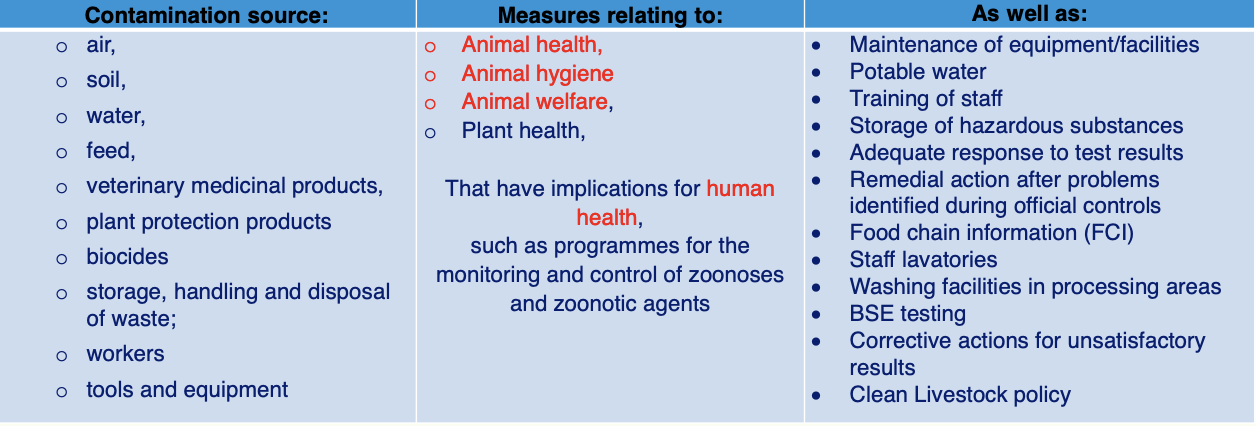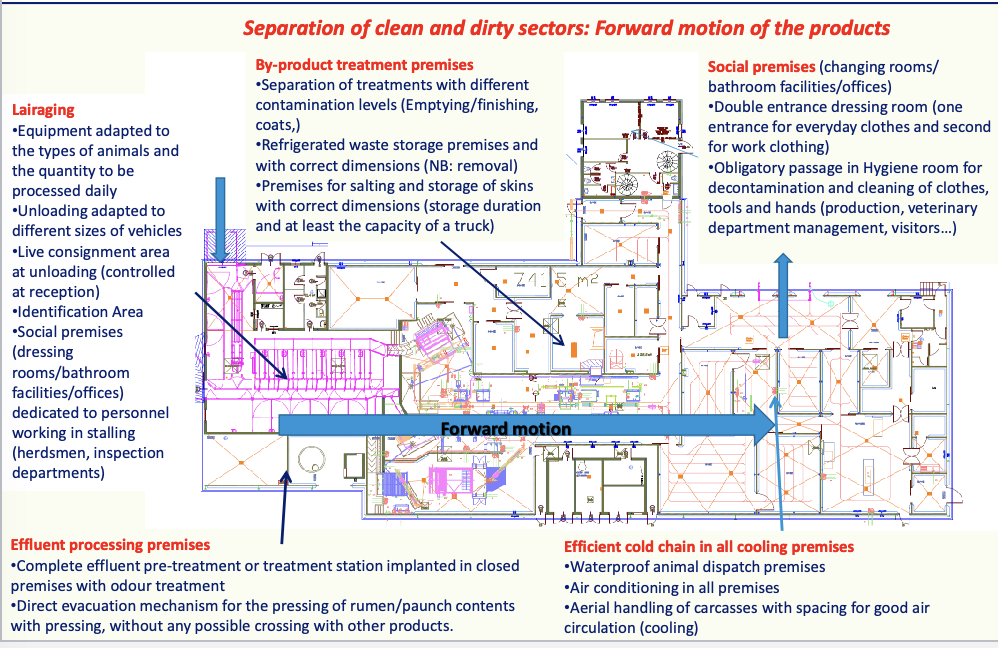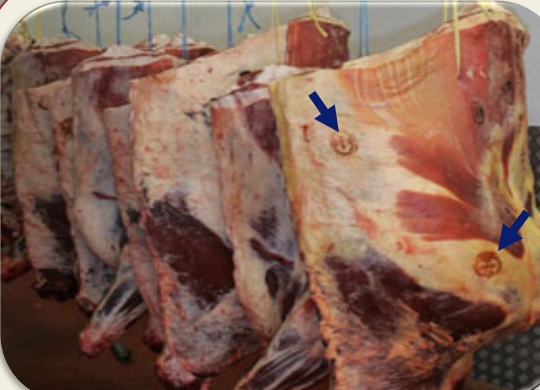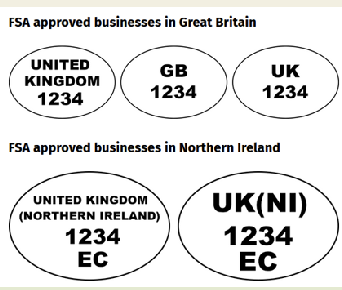Construction and operation of meat plants and prerequisite programmes
1/46
There's no tags or description
Looks like no tags are added yet.
Name | Mastery | Learn | Test | Matching | Spaced | Call with Kai |
|---|
No analytics yet
Send a link to your students to track their progress
47 Terms
what is food hygiene?
all conditions and measures necessary to ensure the safety and suitability of food at all stages of the food chain
what is a food handler?
any person who directly handles packaged or unpackaged food, food equipment and utensils, or food contact surfaces and is therefore expected to comply with food hygiene requirements
what is food safety?
assurance that food will not cause harm to the consumer when it is prepared and/or eaten according to its intended use
what is food sustainability?
assurance that food is acceptable for human consumption according to its intended
use
what is a food safety hazard?
A biological, chemical or physical agent with the potential to cause an adverse
health effect when present at an unacceptable level
what is a food safety risk?
The likelihood of a hazard happening and severity of the consequences if it happens
what is primary production?
those steps in the food chain up to, for example, harvesting, slaughter, milking,
fishing (e.g. production and rearing animals at farm)
what is primary processing?
steps in the food chain where raw material is processed into raw food (e.g.
abattoir slaughter processes)
what is secondary/tertiary processing?
steps in the food chain where raw food is processed into products
ready for sale to consumers (e.g. meat cutting plants, heat treated products, etc)
what are food safety management systems (FSMS)?
A holistic system of prevention, preparedness and own-
check activities to manage food safety and hygiene in a food business
what is HACC?
Hazard Analysis Critical Control Point (system that identifies, evaluates, and controls hazards significant for the safety of food produced in the given process).
what is retained EU law?
domestic law created to preserve legal continuity after EU exit
what is FBO?
food business operator (premises)
who regulates abattoirs?
food standards agency (England)
food standards Scotland
Agricultural, environmental and rural affairs (NI)
what are the responsibilities of the official vet (OV)?
Auditing:
prerequisite programs (PRPs)(GMP/GHP)
HACCP - food safety management system
animal welfare
Ante-mortem inspection
Post-mortem meat inspection
Pathology
Contamination
SRM removal
Residue sampling
Enforcement
what do prerequisite programs (PRPs) include?
(part of the FSMS)
good hygiene practices (GHP)
good manufacturing practices (GMP)
other good practices
what is the role of PRPs?
provide the foundation for effective
HACCP implementation and should be in place before any HACCP-based procedures are established
what are the interrelated elements of the FSMS?
Good Practices/GMP/GHP = PRPs (Codex guidelines; regulatory requirements in the EU – Reg. 852/2004; detailed requirements available in ISO/TS 22002 standard series)
Hazard Analysis/HACCP = OPPP & CCP Control plan (Codex principles & guidelines; regulatory requirement in the EU – Reg. 852/2004; detailed requirements available in all FSMS standards in dedicated chapters)
Other statutory and regulatory requirements (e.g. microbiological criteria, MRLs, communication & traceability)
Management Elements = System (non-regulatory requirements; e.g. plan-do-check-act cycle, internal audit, management review, process-based approach, improvement
what is the legal basis for FSMS?
article 4 of regulation 852/400
hygiene of foodstuffs
article 5 of regulation 852/400
FBOs need to put in place, implement and maintain a permanent procedure based on Hazard Analysis and Critical Control Point principles; es (HACCP)

what are prerequisite programmes?
Preventive practices and conditions needed prior to and during the implementation of HACCP and which are essential for food safety.
Basic conditions and activities that are necessary within the organization and throughout the food chain to maintain food safety
e.g.
good manufacturing practice
good hygiene practice
good production practice
good distribution practice
good trading practice
what is the aim of PRPs?
aim to maintain general food safety but NOT to control specific hazards
procedures that address operational conditions providing the foundation for the HACCP system
what is cleaning?
the removal of soil, food residue, dirt, grease or other objectionable matter.
what is a contaminant?
any biological or chemical agent, foreign matter, or other substances not intentionally added to food which may compromise food safety or suitability
what is contamination?
the introduction or occurrence of a contaminant in food or food environment
what is disinfection?
the reduction, by means of chemical agents and/or physical methods, of the number of micro-organisms in the environment, to a level that does not compromise food safety or suitability
what is an establishment?
any building or area in which food is handled and the surroundings under the control of the same management
what is a tool?
implement that is used in the dressing/processing of carcasses and coming into contact with a carcass/meat
what are HACCP based procedures?
Procedures based on the hazard analysis and critical control
points (HACCP) principles – i.e. an auto-control system which identifies, evaluates and controls hazards which are significant for food safety consistent with the HACCPvery specific (unlike PRPs)
examples of PRPs?

what is the role of good manufacturing programmes? (GMP)
Guidelines to ensure products are consistently produced to a standard that complies with statutory requirements.
• More descriptive than regulations.
• GMP covers all aspects of production inc.:
• Sourcing
• Equipment and its maintenance
• Training, health certificates and personal hygiene of staff
what are good hygiene programmes?
More descriptive than regulations.
• GHP cover all aspects of production:
•checks on food chain information (FCI)
•the design and maintenance of premises and equipment
•pre-operational, operational and post-operational hygiene
•personal hygiene
•training in hygiene and in work procedures
•pest control
•waste management
•water quality
•temperature control
•controls on food entering and leaving the establishment, and any accompanying documentation
who is involved in designing an abattoir?
a team of specialist architects, engineers and construction personnel
what is a lairage?
holding facilities (pens, yards and other holding areas) used for accommodating animals in order to give them necessary attention (such as water, feed, rest) before they are moved on to slaughter
abattoir layout?

what does white, green, blue and brown PPE in an abattoir mean?
white in food production areas
green/blue/brown in dirty
areas
what health and safety equipment is worn in an abattoir?
hard hats
metal chain gloves
masks/respirators
hearing protection
how is knife and hand hygiene achieved?
At each workstation along the slaughterline, appropriately located washing stations and knife sterilizers must be provided.
Hot water (at 82°C), effectively killing most vegetative bacteria (~2 sec.), but not spores and prions.
Alternative treatments possible (i.e. lower temperature/longer time), provided that the FBO validate the treatments
PRPs at meat cutting/boning?
must be kept at low temperatures (to reduce microbial contamination)
what does food chain information (FCI) include?
animal identification
cattle - 2x ear tags, passport
pigs - slap marks, movement licenses
sheep - ear tags and movement licences
Disease status and foodborne hazards status (e.g. Salmonella in chickens)
Knowledge of residues
Movement restrictions (TB or other disease) to the holding area
More extensive in chickens
who is responsible for obtaining food chain information (FCI)?
FBO is responsible for obtaining and evaluating the FCI
OV to verify
who applies health marks?
by the OV or someone under their responsibility


what is a FSMS audit?
A systematic, independent, and documented process for obtaining and evaluating objective evidence to determine the extent to which food safety criteria are fulfilled. It includes procedures to establish the effectiveness of PRPs and the HACCP plan
what are the objectives of an FSMS audit?
determine if the FSMS is operating in an effective and efficient manner and assess whether the audited organization is capable of meeting specific food safety requirements and goals.
to provide evidence that food is manufactured in a safe environment and help determine if hazards are properly identified and controlled or eliminated
what are the 3 types of FSMS audit?
First-party audits are conducted within an organization (internal auditors) and used for self-assessment, internal verification and continual improvement.
Second-party audits usually originate from contractual requirements between a supplier (e.g. slaughterhouse) and a customer (e.g. supermarket).
Third-party audits are external audits conducted by an auditing company, regulatory agency, certification body, or registrar to determine conformance to a specified standard and may lead to certification or registration of the FSMS. Audits conducted by Competent Authorities (CAs) aim to ensure compliance with laws and regulations and noncompliance can result in product withdrawal or recall, and possibly legal action
what is a certification/inspection agency?
means an Agency that is accredited under the International Accreditation Forum (IAF) for delivering FSMS Audits and considered for approval by the authority to conduct food safety audits to certify that FBOs meet the applicable regulations
what is a certification body?
an independent body (private company) responsible of issuing a formal recognition
(certificate) proving that the certification in question meets specific national and/or international requirements.
what regulation allows GHPs in slaughterhouses to be subject to auditing?
COMMISSION IMPLEMENTING
REGULATION (EU) 2019/627